Debunking Common Harrisburg, PA Sealcoating Myths
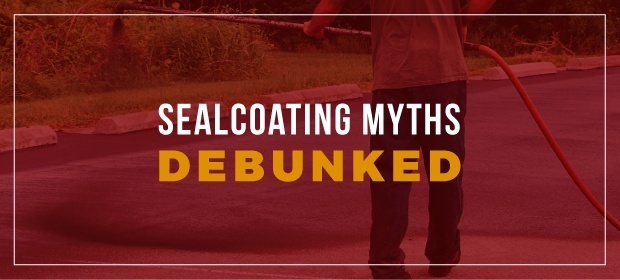
Updated: October 16, 2019
More and more often, businesses and property owners are turning to sealcoating to improve the look and longevity of their asphalt parking lots. According to current forecasts, the asphalt sealcoating industry is expected to grow by almost 5% in the next decade. This figure demonstrates the increasing popularity of sealcoating services for parking lots and other areas where durable pavement is essential.
But many people don't know what sealcoating is or why they need to invest in this necessary pavement maintenance service. Among those who do know about sealcoating, many misconceptions persist.
Below, we debunk some common myths about sealcoating and present some asphalt sealcoating facts.
The Importance of Understanding Asphalt and Sealcoating - Is Sealcoating Asphalt Necessary
If you have a parking lot, there's an excellent chance that sealcoating is important for your business and your budget. According to industry survey results, parking lots make up 80% of the market for sealcoating, though many more applications exist, including the paved areas at racetracks, airfields, school playgrounds, and sports stadiums.
It's essential to understand the important of asphalt sealcoating for a variety of reasons.
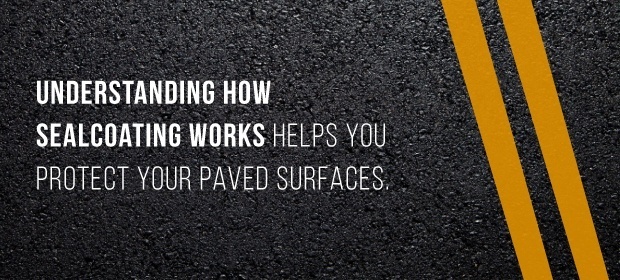
- Protecting your investment: Sealcoating helps protect your pavement AND it saves you money in the long-run. It is significantly cheaper to sealcoat your pavement every 3-5 years than it is to re-pave neglected pavement. Specifically, sealcoating costs less than $0.20 per square foot, compared to the cost of $3.00-$4.00 per square foot to re-pave neglected asphalt. A sealcoat material should be applied to your pavement every 3-5 years to protect the asphalt from water penetration, oxidation, and chemical spills such as oil and gasoline. Of course, sealcoating also enhances the appearance of your parking lot by producing an attractive black surface.
- Creating an effective schedule: Being knowledgeable about sealcoating will help you create a useful maintenance schedule for your property or business. Working with an experienced contractor will also ensure that you are kept on a proper maintenance schedule. Knowing when sealcoating is necessary will help you keep your paved surfaces looking and performing at their peak.
- Keeping costs low: Sealcoating should be viewed by property owners as preventative maintenance for your parking lot since, as stated above, sealcoating keeps your pavement repair costs to a minimum. By staying on top of a sealcoating schedule, you can tackle minor issues before they develop into more costly problems.
It's also important to understand why sealcoating is necessary even when asphalt pavement appears to be in good repair. Typically, an asphalt mixture consists of limestone rock with asphalt used to bind the rock and any protective additives together. Because of continual use, as the asphalt ages and weathers, it oxidizes and becomes brittle. Microscopic cracks begin to form and allow water to seep into the pavement, which can lead to large cracks and potholes over time. It is important to sealcoat your pavement on a consistent schedule as soon as the pavement is installed in order to avoid cracks and other damage.
Asphalt and Sealcoating Myths
Below is a list of common misconceptions about sealcoating..
1. Sealcoating Removes Cracks
Sealcoating cannot remove cracks from pavement. If your pavement already has cracks in it, the cracks will need to be filled by a hot rubberized material prior to sealcoating. It is important that cracks are filled as soon as they start to appear in your pavement. If a property owner does not address pavement cracks within one year of them developing, the cracks will continue to get larger and eventually lead to potholes, "alligatored" cracking, and pavement subbase failure.
Typically, the width, depth, and condition of the cracks in asphalt determine what level of sealing and repair is necessary. If the asphalt has small linear cracks (less than 1/2" wide and less than 1" deep), the best technique for dealing with them is crack filling with a hot rubberized material. If the cracks appear to be "alligatored" or "spiderwebbed" and display a high degree of edge deterioration, more intensive repair strategies will likely be necessary (such as spot patching or partial-depth patching.)
2. Sealcoating Must Follow a Rigorous Schedule
Our general guidelines suggest sealcoating every three to five years, but sealcoating schedules can be flexible. The best maintenance schedule will depend on a few different factors:
- Type of asphalt: Some asphalts are more porous than others, which can affect how often the pavement will need sealcoated.
- Time of year: Summer is the best time of year to sealcoat asphalt pavement. The best weather conditions for sealcoating are 70 degrees Fahrenheit and warmer, with direct sunshine, no recent rain and relative humidity below 60%. Once nighttime temperatures start to drop below 50 degrees Fahrenheit in the autumn season (in the Northeast region), sealcoat material can no longer be applied.
- Traffic and use: If your asphalt receives heavy traffic, it may require more frequent sealcoating than if it receives more limited use. Use of heavy-duty vehicles can also lead to more frequent sealcoating requirements.
- Previous sealcoating intervals: After the pouring of new pavement, sealcoating is recommended 3 - 6 months later. The second sealcoating application is recommended at an interval of about 3 - 5 years after the first. However, this timing also depends on whether cracks begin to appear during these intervals.
- Winter conditions: The harsh conditions of winter in northern regions can cause asphalt pavement to need more frequent sealcoating. Frequent snowplowing, along with use by vehicles equipped with tire chains or studded snow tires, can also lead to more frequent sealcoating requirements.
- Chemical usage: The use of corrosive chemicals near your asphalt surface is likely to lead to a need for more frequent sealcoating.
3. Sealcoat Materials Are All the Same
All sealcoating materials are NOT created equal. A quality sealcoat material will need to be able to pass a rigorous set of standards before it can be applied commercially. That being said, there are sealcoating companies that use "lower quality" sealers in order to cut their costs. It is important that a property owner hires a reputable, experienced sealcoating contractor that can provide knowledge and literature on the sealcoat materials they use. At DB Krieg, our Sealmaster® Pavement Sealer has been thoroughly tested and meets or exceeds every requirement.
4. Sealcoating Is Not Durable
It might seem that because sealcoating is a "top coat" of material, it is not a durable solution. On the contrary, sealcoating is effective because it helps preserve the resiliency of asphalt by filling in, and coating, the microscopic pores that allow water penetration.
5. Sealcoating Is Expensive
Many businesses mistakenly believe sealcoating is expensive. In reality, sealcoating is extremely cost-effective, especially when you consider the project in terms of the expensive repair and replacement it will prevent. Of course, you want to make sure you hire a reliable contractor that upholds rigorous standards of quality in its labor and materials. In other words, the cheapest contractor is not necessarily the best option. Nonetheless, quality sealcoating is very affordable, typically only cents per square foot.
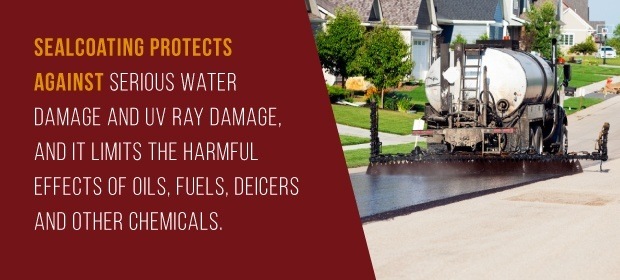
6. Sealcoating Doesn't Offer Enough Benefits for the Investment
Some businesses may think that sealcoating is useful but simply not worth the time and money. However, sealcoating provides invaluable benefits that are well worth the investment. It protects against serious water damage and UV ray damage, and it limits the harmful effects of oils, fuels, deicers and other chemicals. It provides a sleek finish that will give your business an aesthetically pleasing finish, and it saves you the hassle and expense of major repairs down the road.
7. Sealcoating Is Too Disruptive
Many businesses put off or ignore their sealcoating needs because they fear that sealcoating will be too much of a hassle for them and their customers. But a good sealcoating contractor will work with its clients to minimize disruptions as much as possible. While it is best to fully close a parking lot for sealcoating to be completed, it is possible to do the work in "sections" if the business is unable to close the entire parking lot at once. A qualified contractor like DB Krieg can work with you to sealcoat your lot in a way that best meets your specific needs.
8. All Asphalt Sealers and Mix Designs Are the Same
Asphalt sealers and mix designs are different, and the choice plays a pivotal role in the quality and lifespan of the completed work. Too much water in the mix can weaken the performance. On the other hand, added sand can enhance performance by increasing traction for slippery conditions. And added latex can reduce the tracks that vehicles leave in the asphalt. DB Krieg's mix design contains both of these additives, so you can rely on our sealer to hold up in safety, performance and aesthetic appeal.
9. Sealcoating Takes Too Long
Some businesses may fear that sealcoating will be a drawn-out process. Typically, though, sealcoating is quick. After the coating is complete, you must typically wait less than 24 hours before driving and walking on the pavement, depending on weather conditions. A good sealcoating contractor will work with your business to complete the sealcoating within a timeline that works for you.
10. Sealcoated Surfaces Are More Susceptible to Marks
Immediately after sealcoating, surfaces may show marks such as tire tracks, especially during periods of high heat and humidity. This situation is temporary — it will resolve itself when the sealer has completely cured. Typically, this process takes a week or two. Afterward, your asphalt will be as mark-resistant as ever.
11. Sealcoating Makes an Asphalt Surface Look Brand New
Sealcoating provides many benefits for asphalt, but it cannot make the surface look like new. Indentations, depressions, divots and cracks will remain in the asphalt. Sealers can seal these blemishes and provide vital protection against water damage, but they cannot make imperfections disappear.
12. Sealcoating Damages Vegetation
One last misconception about sealcoating is that it damages the surrounding plants and grass. This is not the case. At first, some of the sealer will coat the surrounding grass because it must cover the entire asphalt surface. When you mow the grass, though, your grass will continue to grow back in as normal.
Three Asphalt Myths
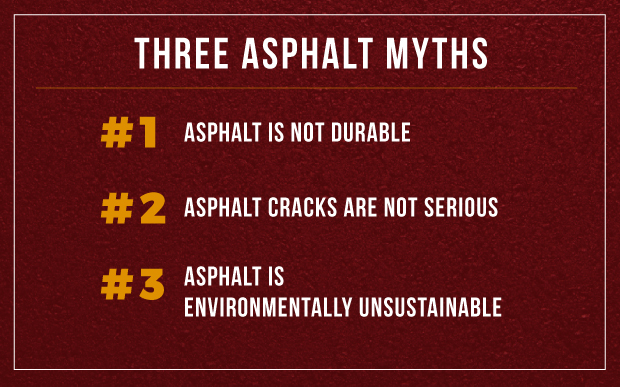
A few myths also persist about asphalt itself.
1. Asphalt Is Not Durable
Some people believe asphalt is not a durable material, especially when compared with concrete. However, asphalt can last for many years if properly maintained. If property owners make sure to crack fill and sealcoat their pavement every 3-5 years, asphalt pavements can last for as long as 35 years.
2. Asphalt Cracks Are Not Serious
Cracks pose a significant risk to the structural integrity of asphalt pavement. Businesses should treat even small cracks seriously and take immediate action to prevent them from growing. Crack filling is the best way to go for tiny cracks because addressing these problems while they are small saves money over the long term. If cracks are not filled with a hot rubberized material by a qualified contractor, small cracks will quickly evolve into larger ones and from there into unsightly and hazardous potholes.
Sooner or later, if asphalt cracks go untreated, the subbase of the surface will fail. At that point, businesses face the considerable expense of replacing their entire asphalt surface rather than filling in a few cracks.
3. Asphalt Is Environmentally Unsustainable
The National Asphalt Pavement Association's surveys confirm that the asphalt industry continuously improves its sustainability practices. It does so by increasing the use of warm-mix asphalt and recycled materials. Warm-mix asphalt is eco-friendly because it uses temperatures that are 30 to 120 degrees Fahrenheit lower than those used for hot-mix asphalt. For this reason, it produces less smoke, uses less energy and results in lower fuel emissions. And recycled materials such as reclaimed asphalt pavement and reclaimed asphalt shingles help conserve raw materials. The asphalt industry recycles asphalt pavement at a rate of 99%.
How Understanding Sealcoating Myths Will Help You Find the Perfect Sealcoating Contractor
Understanding the sealcoating myths listed above will help you in a variety of ways when you're looking to hire a qualified sealcoating contractor. Arming yourself with sealcoating facts provides these benefits:
- Realistic expectations: Understanding sealcoating facts and myths helps you maintain realistic expectations when you're talking to contractors about sealcoating your asphalt. For example, understanding that the reapplication of sealers is normal and unavoidable helps you prepare to sealcoat your pavement every 3-5 years.
- Proper preparation: Understanding sealcoating facts and myths also helps you prepare for your project. For example, knowing that spring and summer is the best time of year for sealcoating can help you prepare your business' budget and schedule accordingly. Knowing ideal timing while remaining flexible will help you talk with your sealcoating contractor to create a schedule that works for you.
- Clear priorities: Understanding the ins and outs of sealcoating also helps you figure out what's important to you. Maybe you need a sealcoat material with additives that provide excellent traction in rain and snow. Or maybe environmental impact is important to you, and it's vital that your contractor use an eco-friendly sealcoat material. Knowing ahead of time what you want from your sealcoating helps you find a service that can check all the right boxes.
Work With DB Krieg for Quality Sealcoating
DB Krieg has served the Harrisburg area and the surrounding Central Pennsylvania region for over 90 years. We use sealcoating materials that have undergone rigorous testing standards, and we are proud to use the most experienced individuals to get the job done. DB Krieg is happy to work with our clients to ensure that our services cause minimal business disruption, and our work is typically dry and ready within 24 hours of application.
To learn more about DB Krieg's sealcoating services for your parking lot, contact us today.
Contact Daniel B. Krieg For A Quote
Please contact Daniel B. Krieg, Inc. by filling out the form below, or by calling us at one of our locations.
 Back To Top
Back To Top

